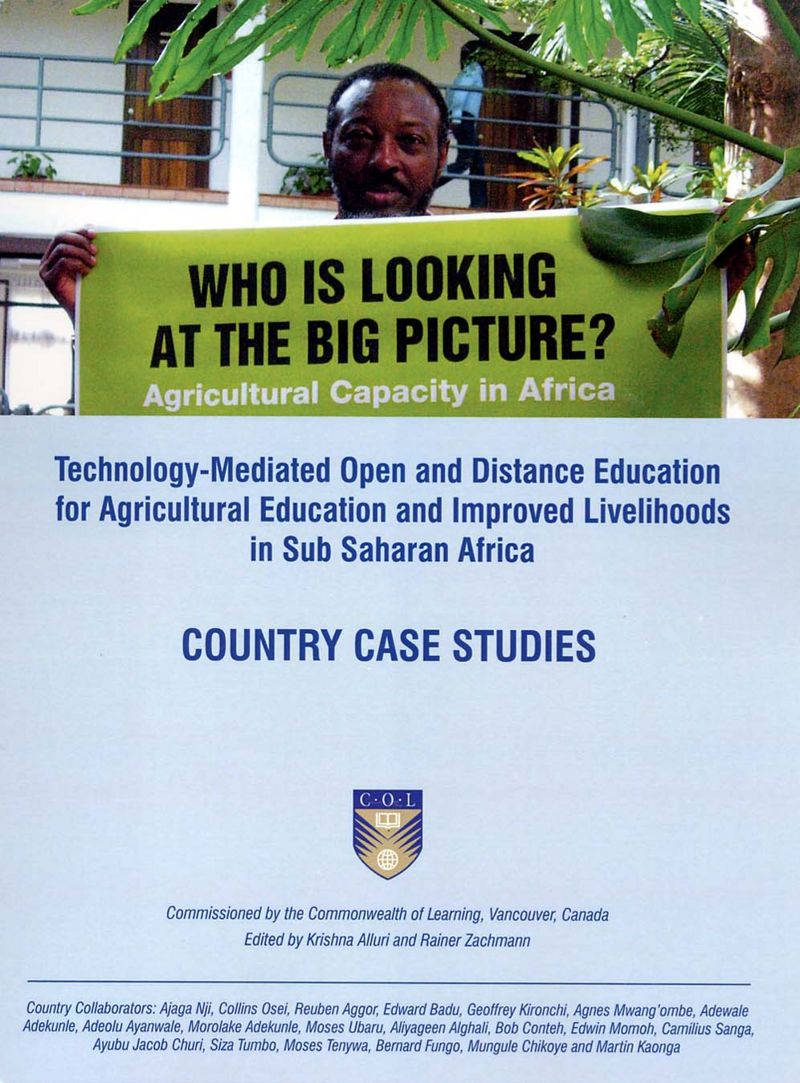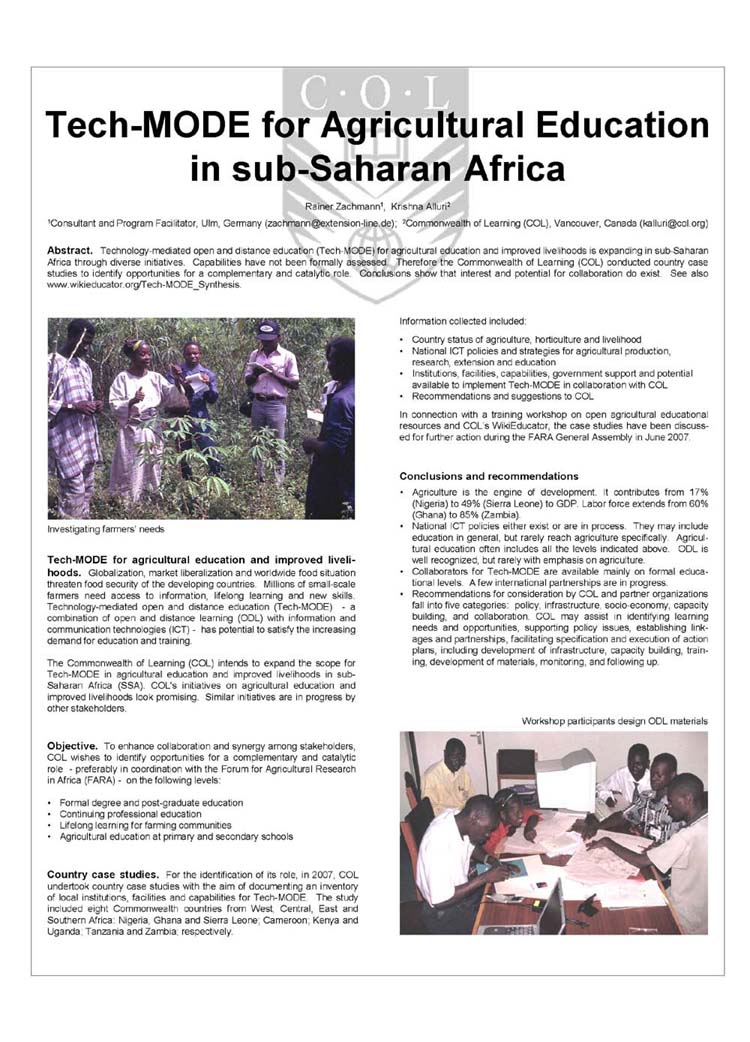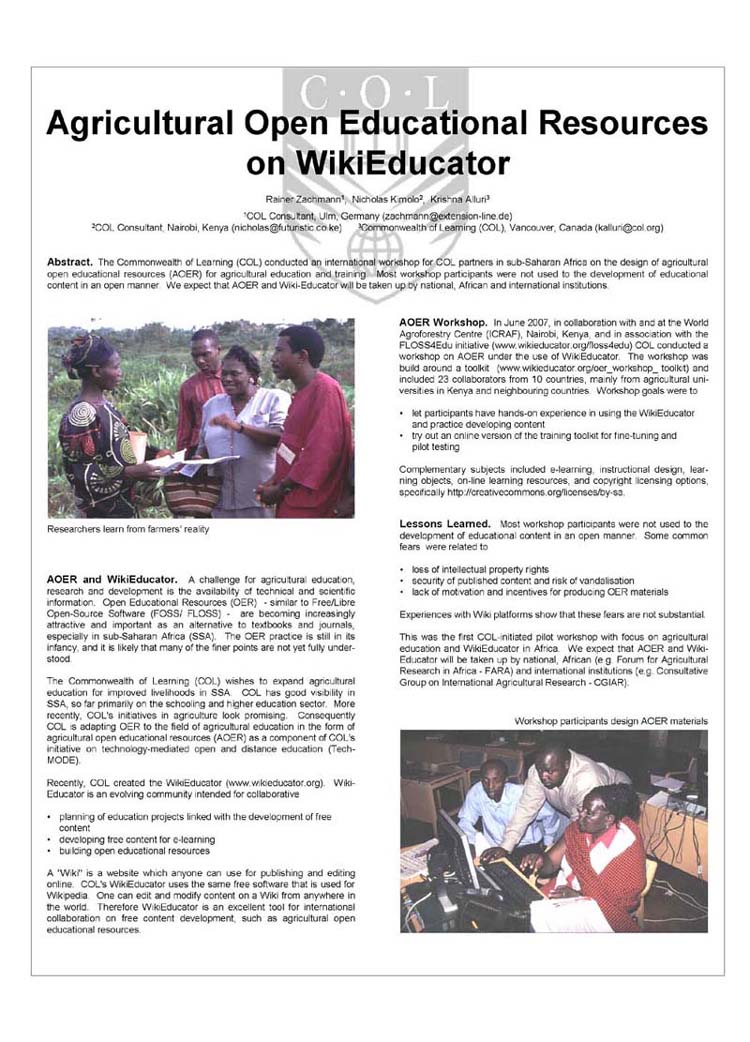Tech-MODE in SSA
Contents
Content
1 Overview 2 Foreword to the Country Studies 3 Biodata of Authors 4 Tech-MODE Poster 5 AOER Poster 6 Related Information
1 Overview
Technology-mediated open and distance education (Tech-MODE) for agricultural education and improved livelihood is expanding in sub-Saharan Africa through diverse initiatives. Capabilities have not been formally assessed. Therefore the Commonwealth of Learning (COL) conducted a few country case studies to identify opportunities for a complementary and catalytic role.
In each country, knowledgeable national collaborators from universities, research and training institutions collected and summarized the information:
Cameroon Ajaga Nji
Ghana Collins Osei, Reuben Aggor, Edward Badu
Kenya Geoffrey Kironchi, Agnes Mwang'ombe
Nigeria Adewale Adekunle, Adeolu Ayanwale, Morolake Adekunle,
Moses Ubaru
Sierra Leone Aliyageen Alghali, Bob Conteh, Edwin Momoh
Tanzania Camilius Sanga, Ayubu Jacob Churi, Siza Tumbo
Uganda Moses Tenywa, Bernard Fungo
Zambia Mungule Chikoye, Martin Kaonga
See the biographies below: Biodata of Country Collaborators
Study Director: Krischna Alluri, Education Specialist, Food Security & Environment, and Team Leader, Learning for Livelihoods, COL. KAlluri@col.org
Coordination: Rainer Zachmann, Consultant, International Agricultural Research, Training and Communications. Zachmann@extension-line.de
Editing: Anthony Youdeowei, Consultant ... AYoudeowei@yahoo.co.uk
This Main Page on Tech-MODE Country Studies in SSA is Tech-MODE_in_SSA
For brief information on the country studies see the poster presentation below:
Tech-MODE Poster
For information on agricultural open educational resources (AOER) see the poster presentation below:
AOER Poster
For a Synthesis Report on all eight country studies see Tech-MODE Synthesis
For the Country Study on:
- Cameroon see Tech-MODE in Cameroon
- Ghana see Tech-MODE in Ghana
- Kenya see Tech-MODE in Kenya
- Nigeria see Tech-MODE in Nigeria
- Sierra Leone see Tech-MODE in Sierra Leone
- Tanzania see Tech-MODE in Tanzania
- Uganda see Tech-MODE in Uganda
- Zambia see Tech-MODE in Zambia
2 Foreword to the Country Studies
The Learning for Livelihoods Sector of the Commonwealth of Learning (COL; www.col.org) addresses the major challenges related to learning and skills development that are the key for living and for improvement of livelihoods. Developing conceptual frameworks, influencing policy, enabling technology-mediated learning, and strengthening networks and partnerships are the strategies that COL uses for promoting learning and skills for agricultural development, poverty alleviation, and environmental protection. To meet this challenge, COL aims at building individual and institutional capacity in the use of information and communication technologies combined with open and distance learning in the way of technology-mediated open and distance education (Tech-MODE).
COL supports learning activities from grassroots to policy levels through partnerships with public, private and community-based national, regional, and international institutions and organisations involved in agricultural education, extension, research and development. In sub-Saharan Africa, the Forum for Agricultural Research in Africa (FARA), and international agricultural research centres of the Consultative Group on International Agricultural Research (CGIAR) are the key international partners.
Anticipating that Tech-MODE will increasingly become an essential tool in the delivery of information, knowledge and education in sub-Saharan Africa, COL undertook eight country case studies with the help of national collaborators from Cameroon, Ghana, Kenya, Nigeria, Sierra Leone, Tanzania, Uganda and Zambia. The practitioners and observers of Tech-MODE for agriculture who provided the case studies share their views on the factors that determine the success or failure of such approaches. COL expects that these studies will be encouraging and useful to, and taken up by partners in the area of agricultural research and development.
COL was very fortunate in attracting the twenty authors and co-authors to make their valuable contributions to this compilation. We were also fortunate in the choice of our consultant, Dr. Rainer Zachmann ably supported by Dr. Anthony Youdeowei who drew upon their experience and knowledge of Tech-MODE in agriculture to shape and enrich the information contained in this report.
Krishna Alluri
Education Specialist, Food Security & Environment, and Team Leader, Learning for Livelihoods, COL - KAlluri@col.org
Acknowledgement
It was a pleasure and honour for the me to accomplish this assignment. I complement COL and Dr. Krishna Alluri for taking up the far-reaching initiative. The effort of the national collaborators in producing extensive and relevant information in short time is admirable. I am grateful to our advisor, Prof. Anthony Youdeowei, for his support.
Rainer Zachmann Consultant, International Agricultural Research, Training and Communications - Zachmann@extension-line.de
3 Biodata of Country Collaborators
Cameroon
Ajaga Nji. Rural sociologist and rural development specialist with a keen interest in technology, social change and development. He introduced the first diploma-awarding distance education programme in Cameroon’s higher education scenario at the University of Dschang in 1992 to become known as the “Father of Distance Education” in Cameroon’s higher education system. Ajaga Nji is currently Professor of rural Sociology and Rural Development in the Faculty of Agronomy and Agricultural Sciences and Vice Rector in-charge of Research and Cooperation at the University of Dschang. He is also the Founder and President of Akwi Memorial Foundation, a Cameroon-based non-governmental organisation dedicated to the fight against poverty. ajaga_nji@yahoo.com
Ghana
Collins K. Osei. Training, education and media specialist with experience in capacity building, rural development and agricultural communication. He has researched, published and presented papers on a range of areas including adult education, capacity building for agricultural extension agents and farmers, and technology skills transfer through distance learning. He is currently a Research Fellow with the Faculty of Distance Education, Kwame Nkrumah University of Science and Technology, Kumasi, Ghana. ckosei@yahoo.com
Edward Badu. Associate Professor of Building Technology and the acting Dean of the Institute of Distance Learning at the Kwame Nkrumah University of Science and Technology, Kumasi, Ghana. With a PhD in Civil Engineering and an MSc. in Construction Management from Nagaya Institute of Technology, Japan and Longhborough University, U.K. Edward is a Professional Associate of the Ghana Institution of Surveyors, a Corporate member of the Chartered Institute of Building, U.K. and the second Vice-President of the Ghana Institute of Construction. edwardbadu@yahoo.com
Reuben Aggor. Adult educator and lecturer in adult and continuing education at the University of Ghana Legon, Reuben specialises in the philosophy of adult education and distance education. He was educated at the University of Ghana, Legon (B.A. Hons) and the University of London (M.A.). He has taught at all levels in the education system in Ghana.
reuben_aggor@yahoo.com
Kenya
Geoffrey Kironchi. Senior Lecturer and Head, Soil Science, Department of Land Resource Management & Agricultural Technology, University of Nairobi. He is a specialist in soil water management and has 14 years of teaching experience at the university level. He has also been involved in capacity building and research in both dryland farming systems and the environment. Currently, he coordinates the project “Strengthening of Agricultural & Environmental Capacities through Distance Education” at the Faculty of Agriculture. geokironchi@uonbi.ac.ke
Agnes W. Mwang’ombe. Principal, College of Agriculture and Veterinary Sciences, University of Nairobi. Formerly, Dean, Faculty of Agriculture, she is a professor of plant pathology and has about 20 years and wide experience in teaching at the University, capacity building, action research and agricultural development. mwangombe@kenyaweb.com
Nigeria
Adewale Adolphus Adekunle. Agronomist with experience in capacity building, rural development, and agricultural communication. He has in the recent past worked extensively in the area of innovation systems in agricultural development with specific focus on the improvement of communications between farmers groups and agricultural scientists. In collaboration with COL and similar agencies, he has developed a model for the sustainable introduction of ICT including the internet to rural communities. He also developed a rapid response platform to farmers’ problems using ICT and an ICT-based commodity exchange platform managed by farmers. He is currently with the Forum for Agricultural Research in Africa (FARA) as the Coordinator for the Sub-Saharan Africa Challenge Program. aadekunle@fara-africa.org
Adeolu Babatunde Ayanwale. Associate Professor of Agricultural Economics and specialist in Agricultural Production and Resource Economics. He is currently the Head of the Department of Agricultural Economics of the Obafemi Awolowo University, Ile-Ife, Nigeria. He has over 15 years of experience at the University level both as a teacher and researcher. He has been involved in capacity building and research work on investments on adolescent education in Nigeria. He is involved in the open and distance learning programme of the Obafemi Awolowo University, Ile-Ife. aayanwa@oauife.edu.ng or aayanwa@yahoo.co.uk
Morolake Omowumi Adekunle. Development Communication Specialist with experience in rural development and the use of ICT to reduce poverty and diseases. She is the Executive Director for the Total Development International Foundation (TODEV). Through TODEV, and in collaboration with COL and the International Institute of Tropical Agriculture (IITA), she has worked on the model for the introduction of ICT facilities including the internet to rural communities. She is currently engaged in content development to improve agricultural and health communications. rolakeadekunle@yahoo.com
Moses Ubaru. ICT specialist with special interest in the use of ICT to solve problems in the rural areas. Recently, he has worked in the area of bridging the information gap at different levels. He played a significant role in the development of the ICT policy in Nigeria. He currently works as a Director at the National Information Technology Development Agency (NITDA).
Sierra Leone
Aliyageen A.M. Alghali. Professor of Crop Protection (Entomology). Vice Chancellor and Principal of Njala University. yekini_alghali@yahoo.com
Bob K. Conteh. Agricultural Economist, Dean of the School of Social Sciences and Senior Lecturer, Njala University. He has over twenty years of central banking experience (Bank of Sierra Leone) before joining the university. His speciality is in the area of Rural Financial Intermediation and he has published several papers on this subject. bob_conteh04@yahoo.com
Edwin J.J. Momoh. Agronomist with a degree in Agricultural Education. He is a Senior Lecturer and Head of the Soil Science Department. He is also the Deputy Director of the Directorate of Planning, Research and Development at the Njala University, Sierra Leone. kattiemoore@yahoo.com
Tanzania
Siza Tumbo. Director, Computer Centre and Senior Lecturer in Information and Electronic Technologies, Sokoine University of Agriculture, Tanzania. He teaches and researches in information technologies, electronic data acquisition and processing as well as simulation modelling. He manages the Computer Centre, which is charged with the management and development of the computer network and its connection to the wide area network. sdt116@suanet.ac.tz ; sdt116@yahoo.com
Camilius Sanga. Lecturer, Computer Centre, Sokoine University of Agriculture, Tanzania. He is interested in the application of ICT in education. He is doing PhD in computer science at the University of the Western Cape, South Africa. Sanga holds a BSc and a MSc in Computer Science. sanga@suanet.ac.tz
Jacob Ayubu. Assistant Lecturer, Computer Centre, Sokoine University of Agriculture, Tanzania. He holds an MSc and BSc in Computer Science and is teaching basic courses in Computer, Computer Networking and Communications. churi@suanet.ac.tz
Uganda
Moses M. Tenywa. Associate Professor, Makerere University. His area of expertise is soil and water management. He has research experience in banana and rice gap yield analysis, water balance, soil erosion, irrigation, indigenous soil systems, land use management, GIS-modelling and rural innovations. tenywamakooma@yahoo.com or tenywam@agric.mak.ac.ug
Bernard Fungo. Currently, a student of soil and water science at the University of Florida, USA. He specialises in soil-landscape analysis using GIS-based tools. He also teaches soil science in the Faculty of Forestry and Nature Conservation, Makerere University, Uganda. bfungo1@yahoo.com or bfungo@forest.mak.ac.ug
Zambia
Mungule Chikoye. Since 1995 Mungule Chikoye has worked for the In-Service Training Trust where he has been involved in the design and delivery of food security and livelihoods related training programmes within and outside Zambia. During 1999 - 2004, he coordinated the pilot implementation of a distance learning programme in grain management for the Southern Africa Development Community (SADC). He further collaborated with the Commonwealth of Learning (COL) in coordinating training materials, development workshops and implementation of a distance learning programme in the agronomic management of cowpeas and soybeans in Eastern and Southern Africa. ChikoyeM@istt.ac.zm or istc@zamnet.zm
Martin Kaonga. Conservation Projects Director, A Rocha International, Cambridge, UK. Martin is responsible for implementation of two global programmes in climate change mitigation and biodiversity conservation. He has 11 years experience in teaching undergraduate and diploma courses in agriculture and environment in Zambia. Apart from designing and delivering short courses, he has also been actively involved in open and distance learning initiatives in Zambia. mlk23@cantab.net; m.kaonga@ntlworld.com
4 Tech-MODE Poster
5 AOER Poster
6 Related Information
Distance Learning for Agricultural Development in Southern Africa
Rainer Zachmann, Mungule Chikoye, Richard Siaciwena, Krishna Alluri
In 2001, the Commonwealth of Learning (COL), Vancouver, Canada, and the In-Service Training Trust (ISTT), Lusaka, Zambia, initiated a program for agricultural
extension workers in Southern (and Eastern) Africa to develop and deliver distance-learning materials. Participants from Namibia, Tanzania, Uganda, and Zambia produced
materials, pre-tested them with prospective learners, improved the materials in a workshop in 2002, and implemented pilot programs in their countries in 2003 and 2004.
Paper: http://www.tropentag.de/2005/abstracts/full/284.pdf
Poster: http://www.tropentag.de/2005/abstracts/posters/284.pdf
ICT/ICM Human Resource Capacities in Agricultural Research for Development in Eastern and Central Africa
Rainer Zachmann, Vitalis O. Musewe, Sylvester D. Baguma, Dorothy Mukhebi
Human capacities are lagging behind the quickly evolving information and communication technologies and management (ICT/ICM). Therefore, the Regional
Agricultural Information Network (RAIN), one of the networks of the Association for Strengthening Agricultural Research in Eastern and Central Africa (ASARECA),
commissioned an assessment of ICT/ICM human resource capacities and related training needs in the context of agricultural research for development. The assessment
included visits and interviews, questionnaire surveys, and desk studies at national agricultural research systems in the ASARECA subregion. We found a general lack of
ICT/ICM policies which has serious consequences, and leads to a wide variety of training needs. Fortunately, most training needs can be satisfied with resources available
locally, in-house, in the country, or in the ASARECA subregion.
Paper: http://www.tropentag.de/2005/abstracts/full/276.pdf
Poster: http://www.tropentag.de/2005/abstracts/posters/276.pdf


